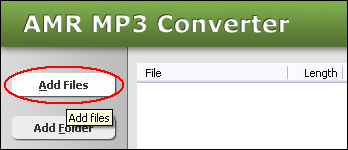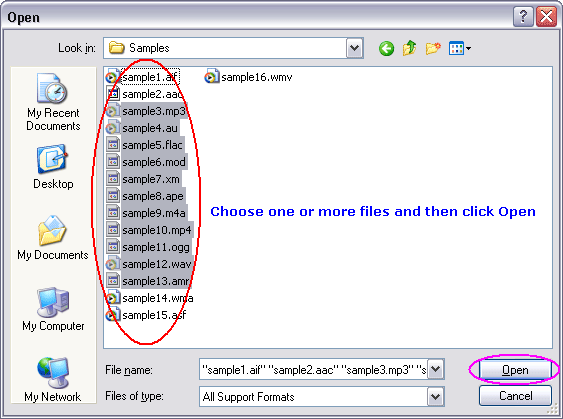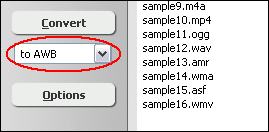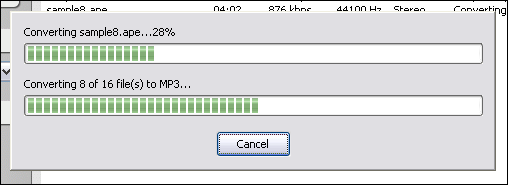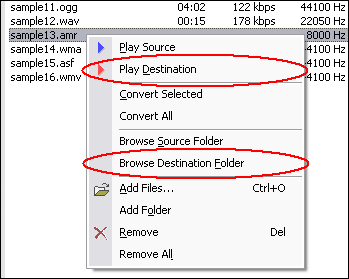M1A to AWBConvert M1A to AWB, M1A to AWB Converter |
 |
| Home | Getting Started | Download | Buy Now! | Screen Shots | FAQ | Support | Contact |
AMR MP3 Converter converts M1A files to AWB format. The software is an all in one audio converter that supports more than 90 audio and video files as input, and converts to popular formats such as MP3, WAV, AAC, M4A, OGG, WMA, and AWB. AMR MP3 Converter also supports batch conversion, and is full compatible with Vista and Windows 7.
What is M1A? Layer I saw limited adoption in its time, and most notably was used on Philips' defunct Digital Compact Cassette at a bitrate of 384 kbit/s. With the substantial performance improvements in digital processing since its introduction, Layer I quickly became unnecessary and obsolete. What is AWB? AMR-WB is codified as G.722.2, an ITU-T standard speech codec, formally known as Wideband coding of speech at around 16 kbit/s using Adaptive Multi-Rate Wideband (AMR-WB). G.722.2 AMR-WB is the same codec as the 3GPP AMR-WB. The corresponding 3GPP specifications are TS 26.190 for the speech codec and TS 26.194 for the Voice Activity Detector. A common file extension for AMR-WB file format is .awb. There also exists another storage format for AMR-WB that is suitable for applications with more advanced demands on the storage format, like random access or synchronization with video. This format is the 3GPP-specified 3GP container format based on ISO base media file format. 3GP also allows use of AMR-WB bit streams for stereo sound. The AMR-WB bitrates are 6.60, 8.85, 12.65, 14.25, 15.85, 18.25, 19.85, 23.05 and 23.85 kbps. Compared to narrowband speech codecs (like AMR) optimized for traditional telephone voice quality of 300-3400 Hz, the AMR-WB codec's wider bandwidth of 50-7000 Hz provides excellent speech quality. Convert M1A to AWB Related Topics: DXA to AWB, EVO to AWB, FLAC to AWB, ALAW to AWB, CDA to AWB, APE to AWB, SPX to AWB, AWB to M4B, QT to AWB, MO3 to AWB, M2V to AWB, NUT to AWB, M4V to AWB, W64 to AWB, AWB to WAV, F4A to AWB, VMD to AWB, F4B to AWB, MPA to AWB, M1V to AWB, MTV to AWB, MMF to AWB, WMV to AWB, DIVX to AWB, VOC to AWB, 3G2 to AWB, DVD to AWB, WMA to AWB, MPGA to AWB, AC3 to AWB, GSM to AWB, HDTV to AWB, MXF to AWB, OMA to AWB, PVA to AWB, AMR to AWB, SOL to AWB, Resample AWB, XM to AWB, PSX to AWB
|
| Home | Getting Started | Download | Buy Now! | Screen Shots | FAQ | Support | Contact | Links |
| Copyright © 2008-2017 Hoo Technologies All rights reserved. Privacy Policy |
